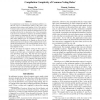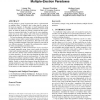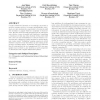85 search results - page 12 / 17 » The Complexity of Bribery in Elections |
AAAI
2010
13 years 9 months ago
2010
In computational social choice, one important problem is to take the votes of a subelectorate (subset of the voters), and summarize them using a small number of bits. This needs t...
CCS
2001
ACM
13 years 11 months ago
2001
ACM
We present a mathematical construct which provides a cryptographic protocol to verifiably shuffle a sequence of k modular integers, and discuss its application to secure, universa...
SIGECOM
2011
ACM
12 years 10 months ago
2011
ACM
In many settings, a group of agents must come to a joint decision on multiple issues. In practice, this is often done by voting on the issues in sequence. In this paper, we model ...
DC
2008
13 years 7 months ago
2008
We consider a distributed system where each node keeps a local count for items (similar to elections where nodes are ballot boxes and items are candidates). A top-k query in such ...
SIGCSE
2009
ACM
14 years 8 months ago
2009
ACM
Complex distributed systems are increasingly important in modern computer science, yet many undergraduate curricula do not give students the opportunity to develop the skill sets ...



